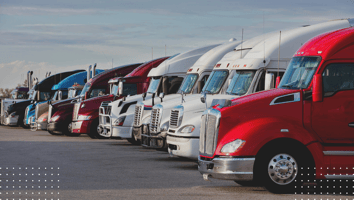Whether you are a truck driver or in the freight business, the trucking company you choose can be...
8 Ways To Save Money On Trucking Insurance Costs
Commercial trucking insurance is a tough expense to control. Even clean driving records can cause your rates to increase. Unfortunately, a semi truck insurance is an expense that every owner of a truck has to face. Small business owners and drivers need affordable coverage that fits their business needs. We understand how frustrating it can be to keep up with the costs of commercial truck insurance and how that's affecting your business. However, reducing your commercial trucking premiums doesn't have to mean giving up on getting the most out of your insurance policy. You may not know it, but you can reduce your commercial trucking premiums and still get the most for your money.
.jpg?width=2400&height=1350&name=White%20Minimalist%20Aesthetic%20Magazine%20Photography%20Portfolio%20Presentation%20169%20(52).jpg) For any company owner or truck driver, trucking insurance is a significant part of running your business. Other than fuel or leasing costs, it is one of the most costly parts of running a trucking business. Insurance premiums also tend to increase yearly, so it is a frustrating expense. Insurance costs in trucking cover commercial auto liability, trailer coverage, and any physical damage coverage. Any claim to your insurance can affect your premium for about 2-3 years time.
For any company owner or truck driver, trucking insurance is a significant part of running your business. Other than fuel or leasing costs, it is one of the most costly parts of running a trucking business. Insurance premiums also tend to increase yearly, so it is a frustrating expense. Insurance costs in trucking cover commercial auto liability, trailer coverage, and any physical damage coverage. Any claim to your insurance can affect your premium for about 2-3 years time.
In order to pay less, you need to be prepared and know what insurance providers are considering in your rate calculation. Trucking insurance costs can get pretty expensive. Here are some ways to lower your rates while still making sure that your truck drivers and trucks are protected:
-
Consider The Importance of Safety Records
The DOT safety record has a strong impact on insurance premiums for drivers. While it is a chore to consider the added steps, compliance with regulations can affect your rates and ensure that you are not paying too much. You want to ensure drivers are avoiding any infractions or violations, so make sure the following factors are met:
- Drivers must have relevant qualifications and license
- Regular vehicle maintenance is essential
- Proper and regular inspections of vehicle must occur
- Always have proper licenses for hazardous or special material transport
-
Prioritize Work Experience and Quality of Drivers
Whether you are a small trucking company or own a large fleet, it is important to make sure that quality drivers are operating for the business. It is a fact that drivers who are more experienced are more likely to get better insurance rates. Drivers with two (2) or more years experience are considered less risky for insurance providers, as they can deal with weather and work conditions with more knowledge. This does not mean young or newer drivers don’t deserve a chance, but it is important to have balance in who is operating a commercial vehicle for your business. For newer drivers, make sure you have a clean record and no accidents, as this can help you get a better rate. The age of a driver also matters, and ideally the best rates would be for drivers 30 and above.
-
Consider an Annual or Semi-Annual Payment
While it may be a huge task to pay up your insurance as one annual payment or even semi-annual, insurance providers are known to provide discounts of anywhere from 10 to 20 percent, for these types of payments. One way to get the money is if you can prepare for an annual payment during peak season and save up enough to where you are able to take care of the insurance for the following year. This is a good step for small businesses who have the budget and ability to take care of this cost, in order to operate with less expenses through the year.
-
Plan Out Your Routes
Your trucking routes can also affect your insurance costs, so mapping them out ahead can help you save money. The more distance you cover for work, the likely you will have a higher rate due to the safety risks and vehicle wear and tear involved. This can be addressed by splitting up your routes, which will decrease how many hours a driver will be covering, if you own a trucking company. For individual drivers or those who are owner-operators, you want to make sure you avoid areas with difficult weather patterns and high population or dense metro areas, as these pose more risks for insurance providers. Look for alternate routes to get to your destination, as it can save you more in the long run.
-
Deductibles Are Always An Option
If you consider a higher deductible, it can lower your usual payments significantly. Changing your policy is a big step so you want to think about it first. A higher deductible means that you will bear the costs of any potential accident or issue upfront, but it will lower your monthly payments. You want to shop around and look for an insurance agent who will offer you the better deal, so be sure not to settle. You want to make sure that you have a policy review set up, so that you can see where you can reduce costs and which is the best option for your company or business. Choose an agent who is specializing in trucking insurance, and one who has access to multiple providers, so that you are not limited. You can look at general insurance quotes using websites such as Insurance Quotes.
-
Pay Your Bill On Time
Your insurance won’t be affected by on-time payments but you will be avoiding late fees and thus making sure your budget stays balanced. Insurance companies do consider your credit, so try to remain in good standing. If you own a few trucks, using one insurance company for all of them will save you money on your plan. Companies to tend to give discounts for ensuring multiple vehicles with them, so take advantage of the opportunity, just vet the company first.
-
Consider Truck or Vehicle Condition
It is no secret that newer trucks which are ten (10) years older or less will be anticipated to have less maintenance or safety issues, so your rate will be affected. Newer trucks may cost less in insurance. A truck’s condition, age and value are factored into your insurance rate. Modern technology or upgrades which keep up with new regulations are an added bonus toward lowering your rates. You can also save money by leasing trucks, as an alternate option, as leasing companies will deal with a lot of the insurance responsibility.
-
Implement More Safety Features
Adding extra safety features such as warning labels, or implementing your own driver safety training or programs, can help lower insurance costs. Writing your own company’s safety policy can reduce costs more than you'd think. You want to update and evaluate your safety programs or features regularly, so that you can expand on any new regulations or data that has come in. Safe driving incentive programs implemented by your company can help reduce your premiums and maintain the quality of your business.
Trucking insurance is an important part of a company's expenses, and one of the largest ones. But it doesn't have to be expensive. When you're on the road, it's all about making money. With the right coverage and discounts, you can reduce your commercial trucking premiums and still get the most out of your semi truck insurance policy. When it comes to insuring your truck, there are plenty of options available. Make sure that you opt for a deal that works for you and your business. Don’t be afraid to do your research and shop around for the best rate.



.png?height=200&name=Orange%20Modern%20Minimal%20Blog%20Writing%20YouTube%20Thumbnail%20(6).png)